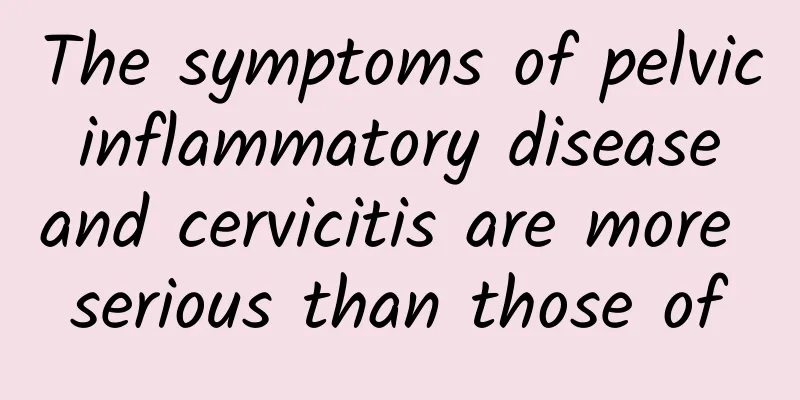The symptoms of pelvic inflammatory disease and cervicitis are more serious than those of

|
According to clinical experience and medical research, the symptoms of pelvic inflammatory disease are usually more severe than those of cervicitis. Treatment of pelvic inflammatory disease requires the use of antibiotics such as ceftriaxone, doxycycline, and metronidazole, and surgical drainage when necessary; the treatment of cervicitis includes local medications such as clobetasol suppositories, antiviral drugs such as acyclovir, and physical therapy such as laser or cryotherapy. The symptoms of pelvic inflammatory disease are more severe, mainly because it may cause more extensive infections and complications. Pelvic inflammatory disease is an inflammation of the reproductive organs and surrounding tissues in the pelvic cavity caused by infection. Common pathogens include gonococci, chlamydia, anaerobic bacteria, etc. Symptoms include severe pain in the lower abdomen, fever, abnormal leucorrhea, pain during sexual intercourse, etc. In severe cases, it can lead to infertility, ectopic pregnancy, and chronic pelvic pain. Cervicitis is mainly an inflammation of the cervical canal mucosa. The symptoms are relatively mild, manifested as increased leucorrhea, bleeding after sexual intercourse, mild abdominal pain, etc. The difference in the severity of symptoms of the two diseases mainly lies in the difference in the scope of infection and the organs involved. The treatment of pelvic inflammatory disease requires the selection of appropriate antibiotics based on the specific pathogens, and surgical drainage to remove pus when necessary. Patients with chronic pelvic inflammatory disease also require physical therapy such as hot compresses and ultrasonic therapy. The treatment of cervicitis focuses on local medication and physical therapy, and severe cases require cervical conization. In terms of diet, patients should avoid spicy and irritating foods, and consume more foods rich in vitamins C and E such as citrus fruits and nuts. Appropriate exercise such as yoga and swimming can help enhance immunity and promote recovery. A comprehensive therapy of drug therapy, surgical treatment, diet conditioning and exercise assistance can effectively relieve symptoms and improve the quality of life. The difference in the severity of symptoms of pelvic inflammatory disease and cervicitis is mainly due to the different scope of infection and the organs involved. Timely and targeted comprehensive treatment measures can effectively relieve symptoms and prevent complications. Patients should maintain a good attitude during treatment and actively cooperate with regular checkups to ensure the effectiveness of treatment. Paying attention to personal hygiene in daily life, avoiding excessive fatigue, and maintaining moderate exercise can help enhance physical resistance, promote recovery, and prevent recurrence of the disease. |
>>: Is surgery for pelvic cystic mass risky?
Recommend
Get rid of obesity during menopause ~ 2 powerful tools: strength training and aerobic exercise
Everyone ages, and once they enter menopause, mos...
What is cervical nabothian cyst?
Cervical nabothian cyst is a common gynecological...
Experts talk about the specific symptoms of the two attachments
Clinically, adnexitis can be divided into acute a...
What are the methods to preserve pregnancy during spontaneous abortion? There are many methods to preserve pregnancy in medicine.
Nowadays, many women have spontaneous abortions d...
What kind of exercise is better for uterine fibroids? What kind of exercise can make uterine fibroids smaller?
What kind of exercise is better for uterine fibro...
Drugs to inhibit uterine fibroids
Drugs that inhibit uterine fibroids mainly includ...
Pay attention to dietary supplements after artificial abortion
After an abortion, you should pay attention to di...
What are the dietary precautions for women with chronic cervicitis? Patients with chronic cervicitis should pay attention to these in their diet
Women with cervicitis need to avoid certain foods...
Patients with ectopic pregnancy should pay attention to postoperative conditioning
At present, ectopic pregnancy has attracted much ...
Will urinary tract infection affect menstruation?
Will a urinary tract infection affect my menstrua...
What are the common causes of irregular menstruation?
What are the common causes of irregular menstruat...
How is primary dysmenorrhea diagnosed?
What is primary dysmenorrhea? How is primary dysm...
What causes cervicitis? Do patients with cervicitis have symptoms of back pain?
Cervicitis is one of the common female reproducti...
What causes uterine fibroid pain? Does uterine fibroid pain
What causes pain in uterine fibroids? Does uterin...
How to Eat Healthy for Patients with Uterine Fibroids
Eat healthy, eat beautiful, eat fashionable is th...









